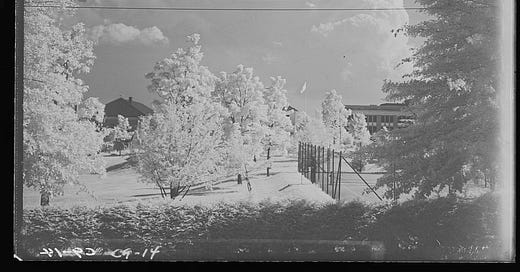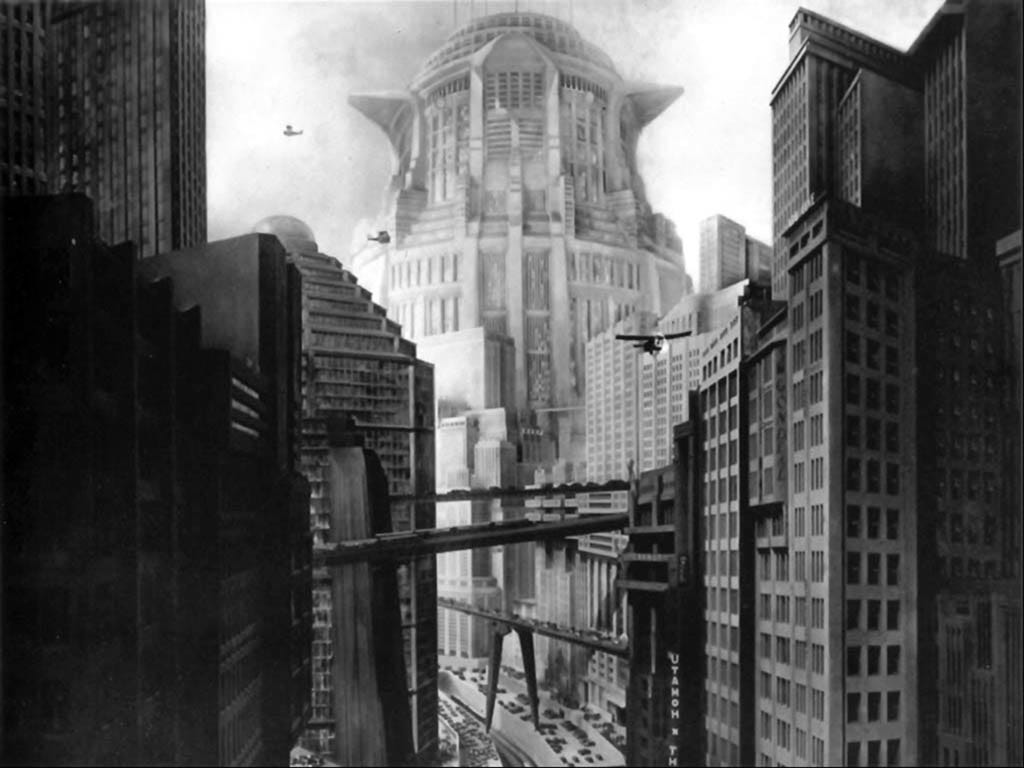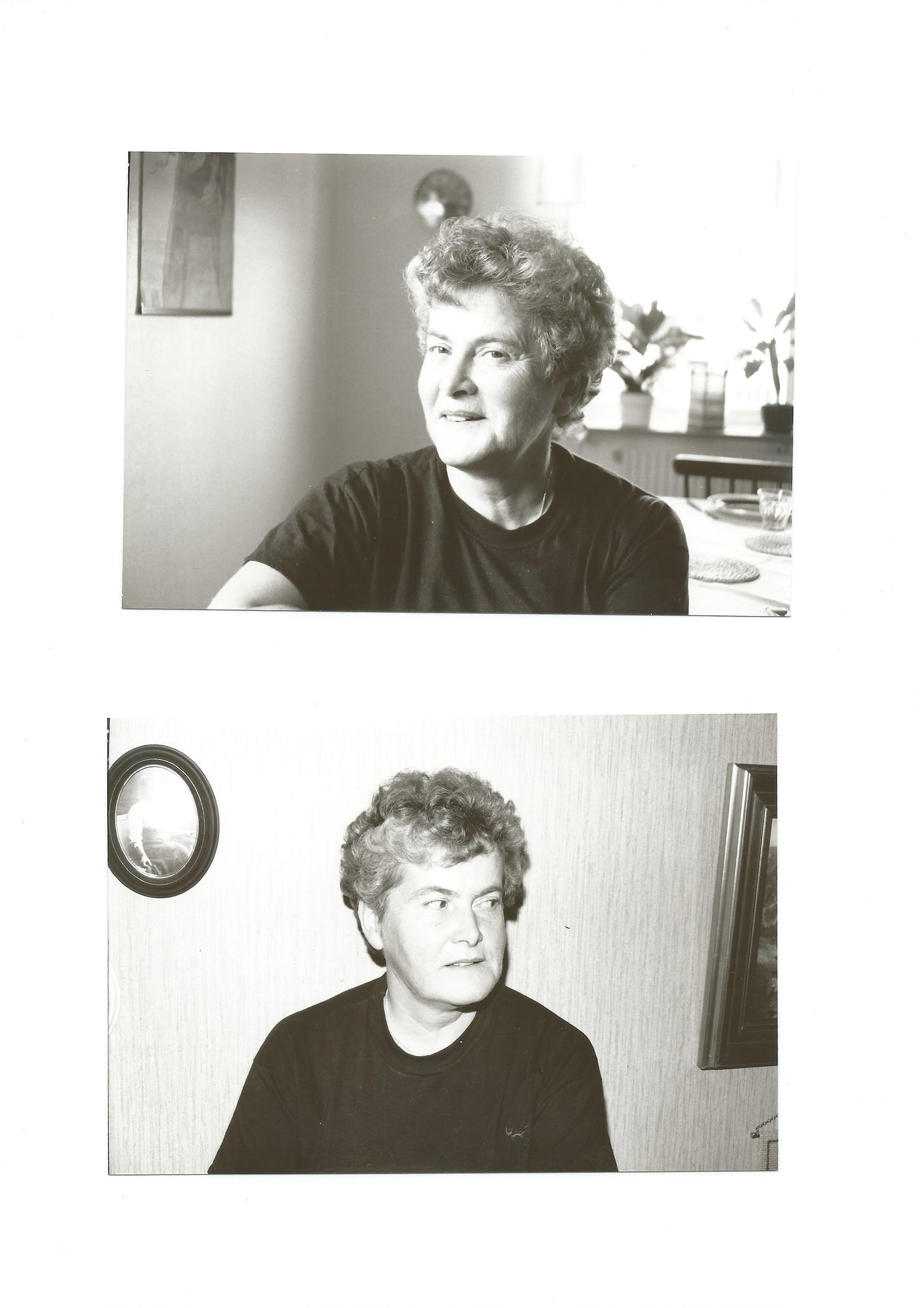Grandma dreamed her face had been paralyzed by a stroke. Waking in the deep of the night, sure her cranium was flooding with blood, she was unable to calm herself down.
“I had to walk into the hallway and look at my mouth and chin in the mirror. To make sure they were not paralyzed! Then I stood there, like this, with my arms raised above my head.”
She is laughing when she tells me this, showing me with arms lifted how ridiculous she had been, standing there counting to ten as the rooms lay dark and silent around her.
This was in the summer of 2016. All afternoon, we had been talking on the porch at the house my grandfather’s friends built him and grandma when he lay sick. We had talked about the war, about the historical romance novels grandma was reading, about my cousins. I was the one asking questions. Then I had gone to bed on an orange-striped flannel sofa in the guest room, reading W.G. Sebald by the light of my phone, taking notes on his grammar—but grandma was so bubbly with words that she burst in to talk more. This is when she told me about her stroke dream.
As I had known her growing up, she was rather shy. Now she seemed full of life. I wondered if it was the approach of death that eased her.
A few months after this, on November 3, 2016, she had a fall. A crossword under her left arm, a cup of coffee in the right hand, she had been walking into the bedroom to lie down when her leg gave out.
Leaning against the door frame, she kept herself upright for twenty minutes, hoping the leg would reawake.
“I didn’t want to drop the cup”, she told me in the hospital. “I should have dropped the cup.”
Instead, she broke the fall with her left shoulder, fracturing it in two places.
As the nurses came in to shove a plastic bedpan under her in bed, so she could pee, I got up to leave, sensing the shame she felt. ”You’ll be fine”, I said.
She was my paternal grandmother.
Behind the curtain, which divided the hospital room in two, a woman of grandma’s age was telling her daughter and grandchild never to return.
”She will not be fine,” my mom said as we left. Mom was an old tomboy. The best we could hope for, she said, was that grandma would die now. Having spent a lifetime trying out wheelchairs and adjustable beds for the sick and dying, mom said she could tell by a glance at a face when it was time for someone to go, and when it would be a humiliation for them to stay.
I didn’t trust her judgment in this case.
But after three days in the hospital, grandma developed double-sided pneumonia and was rushed to the intensive care unit. The room was filled with whirring oxygen tanks and flickering screens and cords hanging everywhere, and we could only visit her one at a time. Her right pupil had fixated at full size. The left one still reacted to light. She stared wildly, like an animal, scratching her head feebly against the blanket as if trying to remove the oxygen mask.
I told my goodbyes, assuming she did not hear me.
When my grandmother was 12, she left school to care for her dying mother. She never told me the details of those years, but it must have shaped her outlook on life—spending four years feeding a mother whose body was failing but whose heart was unwilling to go. She at least never got over the fact that she didn’t continue school. In her eyes, this made her opinions unreliable. Three more years, that would have taught her to think. Now, she had to humble herself.
In 1950, she was sixteen and they buried her mother. On Walpurgis Night that year, she saw my grandfather for the first time—a lonesome man in a crowd, downcast eyes, twelve years her senior. Soon after, they married, and he caught rheumatic fever and never recovered. She cared for him as she’d cared for her mother, and he lived for another forty years but he was hardly ever well enough to play with dad and Anette. In bouts of pain, grandfather spent his days on the kitchen sofa.
When grandma died, I was working at a school outside of Uppsala, Sweden. I had gone there mostly out of ethnographic curiosity—I disliked the work, but I enjoyed the kids. On November 16, as the sun was setting and the last kids were waiting to be picked up, my mother called. She told me grandma had come back to consciousness.
”Is she ok?”
”She was perfectly clear”, she said. “She had a conversation with the doctor.”
“Ok.”
“She asked him to cancel the treatment. They are moving her to another section now.”
I felt the dry air from the ventilation down my neck.
”Are they putting her there to die?”
Anna, the other teacher who worked closing time with me, found me in the corridor crying. Her hair, which she should have stopped coloring years ago, looked like a whig and her eyes had a sad dignity. She told me to go and sit down for a while. She could handle the kids. Saying this, she put a hand between my shoulder blades the same way she did to comfort children.
I looked at the clock and thought that maybe I could get to the hospital in time if I took the next train. But it was only five minutes left, it would never work. I gathered my things and walked down the corridor to my classroom, where I sat down on the shoe rack. The sun was setting on the gravel-dotted snow.
One of the six-year-olds, Cajsa, saw me and came after. Sitting down next to me, she asked what had happened. She was nice to me and said it was sad. I asked her if her grandparents were alive and she told me that her grandfather was dead, but that he had died before she was born—a strike to the head.
“A stroke?”
“Exactly!”
She stood silent for a while. I looked out at the red band of sky at the horizon.
Finally, she said: “I have one more thing to ask.”
“What is that?”
“Do you know where the owl mandalas are?”
Grandma was a telephone operator. When there was lightning, she said, the switching board would rattle and the phones rang endlessly. People calling from America had faint voices. Then the switching boards were automated and she became a home care nurse. Her back gave out, her feet grew numb from diabetes—but she kept the feet, unlike her sister, who twice grew shorter.
At the train station, I ran into a colleague, Cecilia, and asked which end of the train comes in closest to the stairs at Uppsala. She told me and asked if everything was alright. I said no and why and explained that this was why I needed to know where the stairs were going to be, so as not to lose time when we arrived.
She nodded and proceeded to talk for a while about our job and about a new teacher who would start soon. I only said yes and no, and when the train rolled in I apologized and said I had to move closer to the front end.
“Have a nice weekend,” she said.
“You too.”
On board, I asked the conductor if I was at the right end if I wanted to get off fast.
“Do you have to run?” she asked.
“Yes.”
“It’s as usual then.”
“No, it’s actually not.”
I placed my forehead against the window of the door. It had now gotten so dark now outside that the only thing I saw was the outline of my own reflection. Three elder ladies were sitting in a row on the seats outside the toilet; they glanced at me and whispered. I began humming to myself.
I thought about the visit to grandma when she told me about her dream, how I had sat on her kitchen couch and hummed as she cooked. I had had the experience of becoming one with the melody, a melody psalm-like and desolate—I tried to make it come back to me. I fly through the darkness to be with you, I sang over and over as the train moved through the dark fields, constantly changing the melody so that it would not sound like a pop song, but beautiful, dignified, like an open gray valley.
What was she going through her head right now? What did she need to get through this moment of her life?
Dad had texted and said she wanted to know when I was coming, and I had the feeling that she was holding out for me: I would run for her. As we rolled into Uppsala. I started to stretch. Behind me, the ladies commented that the man at the door was getting ready for his run, laughing. I began running in place to warm up.
Grandma had an atlas she annotated, but she never left the village.
Mom says that when my father cried as a child, grandma would leave the room and quietly lock the door behind her.
She struggled in social situations, couldn’t do small talk properly, and did not, as it seemed to me, have access to any other types of conversations. When my wife reads me a questionnaire used to diagnose autism, it strikes me that grandma would have scored highly.
My father, too. He thought he was “somewhat mentally retarded” growing up, a self-image I think he inherited from her. The village school confirmed it. They placed him in a class for the cognitively impaired. When he left high school, he was drafted. The military didn’t pay, but it gave grants to conscripts who studied on the side. At the university, the test scores were nailed to the wall, ranked, for all to see. This was how my father, who needed the money, discovered that precisely every other student was, as he thought of it, stupider than he was. Grandma never figured this out.
In the middle of the hospital ward there was an open space, a kind of reception, where a nurse sat. He had stretched his right earlobe with a yellow plastic ring wide enough to fit a finger through the hole. I asked if I could go inside to see my grandmother, Ingrid.
“I think so,” said the nurse and typing on the keyboard.
On the wall opposite the reception was a set of screens where the nurses could see the heartbeats of the ward’s patients, ten, maybe fifteen hearts, blue-green streaks moving up and down, out of pace with each other. I was wondering which one was grandma, but they had disconnected her, dad told me. He had come out of her room.
There was something innocent about the way he held his body. His face looked old and heavy but his eyes were alive; it was as if he was a child looking out through the eyes of a death mask.
Going in, we first passed a small hallway with a sink, where I put my jacket on the floor, washed and sprayed my hands with alcohol.
“I’m here now,” I said aloud, so grandma would hear.
Dad held up the inner door. Through it, I could see grandma’s feet protrude from under the blanket. The room was dark. Her feet, lit by the rhomb of light from the door, were still wrapped with bandages around tubes and needles. She was half-facing the door so as not to strain the broken shoulder, and the bed had been raised to eye level for the one sitting in the chair next to her head.
“I hurried because I wanted to be with you so much," I said going in.
She opened her eyes and looked at me to signal that she heard.
A moment passed.
Dad took a piece of paper, ran it under the tap, and wiped her forehead. I leaned over and touched her hair.
“Are we alike, you think?” dad asked her. We leaned our heads closer.
She nodded. Dad laughed.
“Yesterday you thought that Alex and I were the same!” dad said. Alex was my older brother.
My aunt, Anette, laughed at the window. She looked older than I remembered her, with her chin flowing diffusely into the neck. She was afraid of death; her children did not want to join the vigil. I walked over and hugged her and felt her grief breakthrough for a moment. Afterward, she stood for a long time looking out at the darkness and at the lights in the darkness that could be glimpsed to the right of the parking garage.
Even though grandma looked weak and sleeping, I could strongly feel her presence in the room, feel how she kept coming up to the surface to hear what we were saying. She tried to answer if we asked her something. From time to time, she opened her eyes and looked around the room, but mostly her eyes were half-closed, trembling slightly. I sat for a while in the chair by her head but then I stood up so dad could sit there—she had turned her head slowly in his direction.
A nurse, not the one with the earlobe, came in to remove the needles that remained. The nurse seemed inexperienced and did not know what was to be removed and what was to be left in. Dad said he thought we would leave the catheter in and pointed to the empty pouch that hung at the foot end. He thought it would be best for grandma, if she needed to pee, he said, and the nurse said it was ok.
Grandma grimaced as a patch holding a needle was peeled off. I felt uncomfortable seeing them disconnect her: I still had a vague hope that she would prove stronger than they thought. Within a few days, I felt, she would re-evaluate her decision and let them put in the treatments needed to get her restored. The nurse pulled out the first needle and blood pulsed out over the bed sheet.
I was standing next to Anette, and I wondered how she took this.
The blood continued to leak despite the nurse pressing a paper napkin against the wound.
“Do the blood vessels get a little stiff when you lie like this?” dad asked.
“On the contrary,” said the nurse.
Dad leaned close to grandma: “There was a little blood now. They will patch you up.”
The nurse stretched for the alarm button on the wall but she couldn’t reach it—her fingers waved helplessly in the air. She had to release the napkin she pressed against grandmother’s legs. Another pulse of blood shot out. She pressed the button and then regripped the leg.
To give room for the nurses that ran in, dad and Anette went out. I said I wanted to stay and sat down next to Grandma and explained what was happening, just as Dad had done. Down by the leg, the nurse stood and inspected the napkin that had been darkened by the blood, shaking her head. I told grandma the new patch was coming.
“Is it . . . good . . . with you?” said grandma.
“It’s just fine with me,” I said. “But you are having a hard time.”
“Yes.”
The nurse apologized, leaned between us, and raised the bed. I got up so I could stay at eye level.
“You . . . are,” grandma said.
“Yes?”
The nurse removed the second needle and said: "Oops! Here there was just no blood at all instead!" The nurse with the earlobe had come in with patches and tape, and I turned back to grandma and leaned closer to block out their actions and their distant way of talking.
“Have . . . kids,” grandma said.
I had told her that we were expecting on the night when she stared wild-eyed and tried to remove her mask. I hadn’t thought she heard.
“It feels very exciting,” I said. “And a little scary.”
“When?”
“In June.”
“What’s it going . . . name?”
“We haven’t decided yet.”
She fell silent.
I leaned forward and kissed her on the forehead, remembering that I had done it once last Christmas, too—but then I had done it sneakily without her noticing. Now I knew she knew, and I was afraid it scared her, this sudden show of affection, but I hoped she thought it was beautiful.
I figured it was nice for her to know about the child we were expecting, but I was also afraid that it was demanding to have to be polite to me and think about my world, so I said nothing more, just signaled as best I could that I was there for her if she needed something.
After a while she opened her eyes and looked at me. She whispered something. I couldn’t catch it.
“Can you say again?”
It wasn’t a word, only a syllable which she repeated, failing to go further.
After a long while, it dawned on me that what she was saying was my dad’s name, and I got the impression that she wanted to say her last words to him and Anette, so I hurried out. I ran through the corridor, looking in through the open doors. It took several minutes before I found them, in a resting area, where there was a table game placed on the table. I told them to hurry back.
But when we walked into grandma’s room again, I realized that she hadn’t wanted to say anything. She just didn’t want to be alone with me: she wanted to be with those she could be weak in front of.
Looking over these notes, I realize that grandma probably felt a nervousness similar to mine on that night. The truth is she was never fully at ease around me. When in my twenties I took the train out to visit her, she would sometimes call my mom asking her if I wasn’t bored by her. What could she talk about with me? What did I like? Did I just go out of duty? Not being able to answer these questions made her uncomfortable.
It relaxed at the end and we figured out how to have fun together. But our love was mostly expressed indirectly, by the nervousness and shame we felt for not making the other feel loved right.
At one point during the vigil, I tried to joke with her, saying it was a shame she didn’t have the cookies I loved, the one’s she always baked when I would visit: Brysselkex. These cookies had been a running joke for as long as I could remember; I had been obsessed with them as a kid. But in her delirium, she didn’t remember the joke.
“Wallet”, she said—wanting me to find her wallet so I could buy myself cookies,—“Wallet”, she said—thinking I was disappointed she didn’t serve me—“Wallet.” I closed my eyes.
Neither I, Anette nor dad said much most of the night. We gave each other glances and asked grandma now and then if there was anything we could do to make it more comfortable for her.
A nurse came in and explained that she would remove the probe and that it could be a little unpleasant: “I recommend you to wait outside.”
Mom was just arriving, so we met up with her in the dining room to eat a salad she had brought. Another nurse stuck her head in and explained that we could not go up to the sink. Instead, we should call on her or some other nurse if we wanted something. Plates and cutlery, we said.
“Are you ok with small plates?” she said.
I told my mom that grandma had remembered that I was here the day before.
Mom said she had asked Grandma if she remembered that Alex, my brother, had been there. She had been unsure. “But then”, mom said, ”as soon as he showed up, this morning, she asked if he had the cat with him. So she recalled that he had shown her pictures of the new cat after all. And Alex, you know, he grabbed the chance at once, and began to spin a yarn about smuggling in the cat in his backpack and the nurses catching it.”
Mom laughed and Anette drew on her mouth.
“She has a lot of strength anyway, even though she can seem so timid,” mom said and put the lid on an empty salad jar. “To be able to be that clear in the state she is in.”
“But we’re getting to a stage now where she says yes to everything,” dad said, looking out the window. “It gets a little diffuse now what she understands and doesn’t understand.”
That comment made Anette look uneasy.
"We had a very nice conversation," I said quickly. “I had told her what I wanted to say last time, but it was nice that she could answer now and to know that she had understood.”
”What did you tell her?” mom said.
“You know, how it is with me and stuff. She asks questions.”
“It’s unbelievable,” Anette said. “Her being able to be caring in the middle of all this.”
We talked about how hard it was to sleep. Anette asked vaguely, as if it was a philosophical question: ”Where to go to sleep after all of this?” She meant tonight—she was hoping that my parents would invite her because she could not face going home herself—but dad wanted to lighten the mood, so he pretended not to understand and instead proposed going to Färna, a spa facility that he and mom had returned from the day grandma fell and fractured her shoulder. It turned out that Anette had also been at Färna last winter, so they spent the rest of the meal talking about the spa and I thought of all the antibiotics that must have been fed to the chicken on my plate while it was alive.
“Should we go to her?” I said after a while.
Dad leaned in over the dashed line that showed where visitors weren’t allowed to go, looked around, and put the plates on the sink.
When my wife Johanna arrived, we discussed how to set up the vigil. It could take days, mom said. Or she’d die tonight. She thought dad should go home and rest—he had sat with grandma for almost a week now.
I started promoting this idea as if it was my own, with vigor—I wanted us to have a plan, a schedule. That made me feel like we had control. Dad hesitated. But I persuaded him to go with me and Johanna to their apartment. We would sleep for a bit and then replace Anette and mom at midnight. That was a plan. We were doing something rational.
At my parents’ apartment, which looked out over a forest park—pine, spruce, birch beneath us—we ate sandwiches and went to lie down.
Looking up at the little shade of sky and forest that showed through the window, I thought about what I had seen at the hospital, the words we had said to each other, and I thought about grandma and her life. There was a buzzing sound in my head as if I was on board an airplane, but I wasn’t disturbed by the sound. I thought about what dad had said about the night when he had watched over grandma in the intensive care unit—about all the air blowing from the machines, and how it had made him feel like he and grandma were on an airplane, making one last long trip together. The screen showing the heartbeat, it didn’t tell you much, but you couldn’t stop looking at it. Like you couldn’t stop looking at the maps showing the plane moving toward its destination.
Johanna lay curled close to me with closed eyes. I assumed she wasn’t sleeping either—she usually couldn’t sleep if I was awake—and when she turned over after half an hour, I whispered to her. She confirmed with a quiet no and suggested we’d go up and pee, or rather, she said she needed to pee, and when I said I thought I might also need to do that, she said that was probably a good idea.
I had not done my laundry for a long time and therefore wore some underwear that I had found at the bottom of the drawer, a pair that I had borrowed from my brother a long time ago, too big for me. I had to hold on to them with one hand as we sneaked out through the kitchen. Johanna walked after me with a towel wrapped around her body.
At the kitchen sink I stopped: dad was talking to someone in the bedroom.
Johanna and I exchanged a glance and she continued quietly toward the toilet. From the darkness, I heard dad say yes, mm, yes, and ask questions I didn’t understand. Then he hung up and came out to me in the living room.
“It’s over now,” he said. “Grandma fell asleep a while ago.”
He held me.
“She was perfectly calm.”
“Good,” I said.
“Anette and mom said they were relieved. It had been difficult for a while, but then they had talked and Grandma had grown calm. And then she fell asleep.”
“That’s good. That’s good for her,” I said.
"I’m going down there. We’ll have the room available as long as we need to. You don’t have to come.”
“I want to.”
“Then you do that. The important thing is that you got to be with her for a while tonight. That feels good to me now.”
“I want to go.”
Johanna came out of the toilet and I explained that it was over now and that we would go down. I told her to do as she pleased—if she wanted to stay or come along. She wondered what I wanted. I did not know.
“It feels like it’s a thing for your family,” she said.
“Do you feel you can stay here by yourself?”
“I do,” said Johanna.
“Should we walk down or do you think we should take the car?” dad asked in the hallway.
“I think we’ll take the car,” I said. “It feels like it will be too much walking there and back.”
“You’re right.”
“Can you drive?“ I said.
“Yes. Yes, that’s not a problem.”
I put my shoes on. Then I asked if he was going to call my brother.
“Do you think we should?”
“Yes, I think so. I can do it.”
He shook his head and went back into the bedroom. I stood in the doorway and listened as they talked: it sounded like it took a while before Alex understood what had happened, or maybe it took a while for him to make a decision.
“I woke him,” Dad said as he hung up. “He was half asleep.”
“Is he coming?”
“Yes. I asked if we should pick him up, but he wanted to take his bicycle.”
In the elevator, dad squeezed my shoulder and we looked at each other in the mirror. He looked old. When he turned on the car, classical music started playing. I asked him to turn it off.
Out on the street, it felt like it was in the middle of the night, but looking at the dashboard I noticed the clock was barely ten. There was not a single person to be seen anywhere. The car carried us through an empty city. Enclosed in this emptiness, we sat quiet until we reached the hospital.
Dad turned down the serpentine path to the maternity ward, where there were two vacancies. We decided to park there; it felt fitting. He put in money for a parking ticket that was valid until 00:02.
It’s like a whole city you walk into when you enter the hospital from that side, a city of sickness and death, a place where you either suffer or work. Monumental buildings extending upwards on all sides and walkways high above the ground—made me think of Fritz Lang. I started down toward the infection clinic. On the other side of the road, shrubs had recently been planted and would grow for the first time this spring.
“What a factory this is,” I told dad when he came.
“Yeah.”
“She got many years because of this,” I said.
“Medication, you mean?”
“Yes, her diabetes, for example.”
We passed the ward where she had been lying with animal eyes and an oxygen mask, the ward where dad had made a trip with her, and where she had decided that she did not want to go through this again. Everything was still and quiet.
When we approached the entrance, dad was talking to mom on the phone and told her we were on our way.
“Wait,” he said, and quickly ran to the inner door that was about to strike shut after a woman had stepped out: “No, we came in anyway, there was someone who just walked out here.”
When we got up, we saw a nurse in the corridor and she opened the locked door when we waved. As we rounded the corner we saw mom coming towards us.
“You were fast,” she said. We hugged.
Anette sat in the armchair at the window where she had stood before. I walked over to her.
“It felt good,” she said. “She looks so calm.”
I saw grandma in the corner of my eye. I turned. She looked more compact now when she wasn’t breathing. The slightly dull color of the skin, the half-open mouth, the absolute stillness—it scared me. She did not look right. There was something unnamable that was not right. They had lowered the back of the bed so that she lay flat now, and she rested on the broken shoulder. When I caressed her hair, her skull felt hard. I had to go away for a while and collect myself.
Both arms were lying in front of her, with palms half turned upwards which made her look vulnerable and holy, and her feet were stuffed under the blanket for the first time tonight.
Dad came in. I stepped aside so he would have the space. As he patted Grandma’s hand, Anette told us it had been so quiet.
Mom looked like a mischievous boy. “Anette and I sat here talking about dance”, she said. “And then I asked grandma if she had danced. Yeah . . . she said. Well, what did you dance then—foxtrot?”
Mom leaned her head back and closed her eyes to imitate grandma: “Waltz . . . ”
“So she had danced?” said Anette, confused.
“It can’t have been much”, said mom.
Dad said: “She danced with me at our wedding.”
I walked around the bed so I could see her from above: that was the angle I was more used to since I was taller than her. She looked more like my grandmother from this angle, and also I didn’t have to look into her open mouth. I took her earlobe between my fingers and massaged it, comforting myself by making movements that looked like they were comforting her. She was still warm.
When Alex arrived we all hugged again. Alex was wearing a jacket in a soft fabric, halfway between dinner party and bathrobe, and looked confused but calm in his half-bearded way. He hugged dad for a long time.
Then he went over to the bed. “Hi grandma,” he said.
When he looked at her, I looked at him. Carefully he opened her hand and put his in hers. Then he stood there for a while, and the rest of us waited silently for him to land in the room. After a minute, he gently backed away and stood next to dad, who was sitting in the chair by the bed.
“It was very calm,” Anette said.
Alex smiled at her. There was such genuine warmth in his smile.
“It got a little difficult for a while,” said mom. “But they gave her a shot for the pain and the anxiety and then she could just lie here and listen to us girl talk.”
“What? Did she get anxiety you mean?” said Anette.
“Yes, she started kicking her legs for a while and at that point there was probably some anxiety. Didn’t you notice?”
“I don’t know, I,” Anette said.
Alex who noticed mom was making Anette uncomfortable intervened. He began talking about a restaurant he had eaten at on his birthday—he addressed Anette when he spoke, and I could see how good that felt for her, to talk about the everyday. He spent several minutes describing the restaurant and what they had eaten—lamb and mussels.
After five minutes, dad seemed to grow annoyed at Alex describing the taste of lamb. He moved closer to the grandmother and took her hand as if to focus in on the grief and on this moment. A minute passed.
“I asked her if she thought much about father now in the end,” dad said. He looked at us and nodded. “She did.”
That night, I found solace in Sally Mann’s exhibition What Remains, where Mann has photographed human bodies that have been placed in the woods outside a forensic research lab, bodies that are in various stages of rot—a thigh where the flesh has burst like a flower, a fat man whose abdomen bleeds into the earth, a spider that builds a nest in the eye pit of a skull. When I saw that exhibition, I had been touched by how lovingly Mann looked at these bodies, and I mimicked that way of looking at the dead. I felt a reverence for my grandmother’s flesh cooling under my hands.
On the arm with the broken shoulder, grandma had bruises and I thought about how the blood was about to sink toward the lowest point of her body, where she would soon get a discoloration. A purple patch. I thought about the bacteria in her intestine that would soon turn on their host. These thoughts didn’t scare me anymore. She was beautiful. She had been a world. She was matter.
In memory of
Ingrid Karlsson
1932–2016
If reading this has been a meaningful experience for you, it would mean a lot to me if you gave it a like. It helps others find it, and it lets me know what I’ve worked on has resonated with someone out there. If you think someone you care about would like reading this, please share it with them.
Warmly,
Henrik
















I have kept this in my unread emails for nearly a month, after having opened it day it arrived in the inbox and gotten a couple-few paragraphs in before realizing it was something I needed time, and space, to take in word by word.
I've been there -- multiple times. Amazingly many times. Stuff like staring at the chicken thinking about antibiotics and discussing a bite of lamb is common, understandable, and human. You illustrate it well. And unfortunately, since I've seen this happen so often, I sometimes take the role of your mother, the one who sees when the last threshold of 'coming back' is passed and realizes the rest is just keeping everyone as comfortable as possible.
You did a good service, to yourself, to your family, and to others who have experienced grief from death, in writing this as detailed and intimately as you have.
What a beautiful tribute to her. I remember when I lost my great grandmother when I was 8 the first person I ever lost. And it makes me think about my grandmother, now 87 whose loss I dread more than anything in this world. I wrote a bit about them here: https://comfortwithtruth.substack.com/p/the-children-get-up-and-reign-anotherhtml Thanks for sharing.